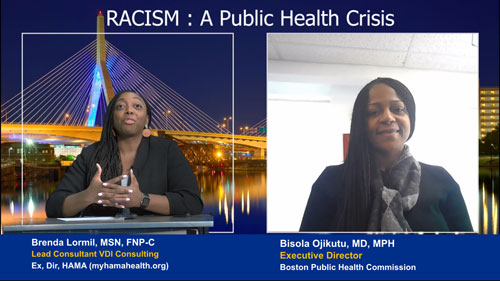Randolph (Massachusetts)- By YVES CAJUSTE – In a recent interview on MCTV Boston, Dr Bisola Ojikutu, the executive Director of Boston Public Health Commission (BPHC), addressed the critical issue of racism as a public health crisis. Dr Ojikutu is a nationally recognized physician leader, health equity researcher, community advocate and expert in the prevention, care, and treatment of infectious diseases.
Dr. Bisola Ojikutu highlighted some of the key ways in which structural racism impacts health outcomes during an interview broadcasted on CuencaVision in Greater Boston on Wednesday night, as well as in 12 other cities in Massachusetts this weekend.
Dr. Ojikutu’s definition of structural racism : a system where institutions and policies actively create and sustain racial inequities in social, economic, and political domains. She noted that this system operates through hierarchies, privileges, and power dynamics that systematically exclude non-white individuals and perpetuate racial disparities.. This definition establishes the basis for the conversation with Brenda Lormil (MSN-FNP-C) on the impact of racism on health outcomes.
Structural racism can impact health outcomes through various means, and housing policies are one such example. Dr. Ojikutu cited the historical practice of redlining, which dates back to the early 1900s, as an illustration of this phenomenon. Residential segregation resulting from this practice persists in Boston, with white, affluent individuals residing in well-resourced neighborhoods while black and brown communities inhabit under-resourced areas. The latter lack access to quality healthcare services, leading to unfavorable health outcomes.
Dr. Ojikutu presented some alarming statistics that underscore the health disparities in Boston. Notably, between 2017 and 2021, premature mortality rates for black residents in Boston surged by 37%, whereas no significant changes were observed for Asian, LatinX, and white residents. She also mentioned that life expectancy in Boston is 81 years for the general population, but only 71 years for black males – a 10-year difference. These statistics demonstrate that structural racism has a significant impact on health outcomes.
To combat these inequities, Dr Ojikutu explained that the Boston Public Health Commission collects (BPHC) data, develops policies and implement programs and interventions that are tailored to address the specific challenges that these populations are facing. For example, throughout the COVID-19 crisis, the BPHC placed a strong emphasis on equity by strategically locating vaccination and testing sites in neighborhoods such as Dorchester, Mattapan, and Roxbury. These sites were staffed with highly qualified individuals who were not only fluent in the language of the communities they served, but also deeply familiar with their cultures and customs.
The Boston Public Health Commission has also made an investment in the Center for Behavioral Health and Wellness. This program aims to train healthcare providers to offer quality care services to individuals from diverse backgrounds, thus ensuring equal access to healthcare for all, added the Executive Director of the Boston Public Health Commission. .
During this interview on MCTV Boston, Dr Ojikutu emphasized the significance of the Mass Health Redetermination process, the importance of updating information and determining eligibility on an annual basis. She urged the audience to help spread the message and to call the Mayor’s Health Line at 617-534-5050 for more information.
In summary, Dr. Ojikutu’s interview has highlighted the urgent matter of racism as a public health crisis. The impact of structural racism on health outcomes is far-reaching, making it imperative to implement policy and programmatic interventions to tackle this issue. Although the Boston Public Health Commission (BPHC) has taken measures to address health disparities, genuine progress towards health equity and social justice can only be achieved through collaborative efforts.
YVES CAJUSTE
ycajuste@infohaiti.net




